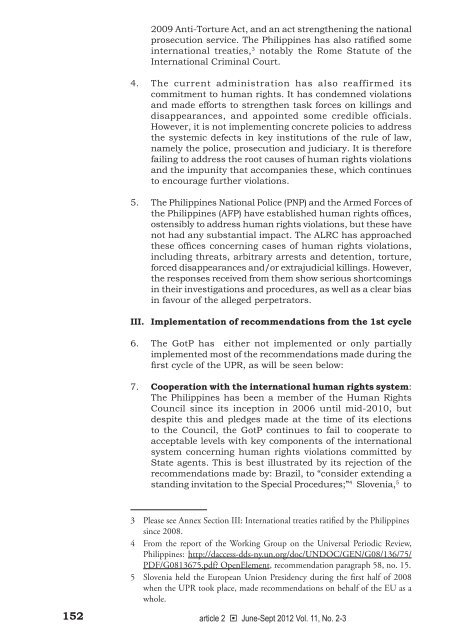Create successful ePaper yourself
Turn your PDF publications into a flip-book with our unique Google optimized e-Paper software.
152<br />
2009 Anti-Torture Act, and an act strengthening the national<br />
prosecution service. The Philippines has also ratified some<br />
international treaties, 3 notably the Rome Statute of the<br />
International Criminal Court.<br />
4. The current administration has also reaffirmed its<br />
commitment to human rights. It has condemned violations<br />
and made efforts to strengthen task forces on killings and<br />
disappearances, and appointed some credible officials.<br />
however, it is not implementing concrete policies to address<br />
the systemic defects in key institutions of the rule of law,<br />
namely the police, prosecution and judiciary. It is therefore<br />
failing to address the root causes of human rights violations<br />
and the impunity that accompanies these, which continues<br />
to encourage further violations.<br />
5. The Philippines national Police (PnP) and the Armed Forces of<br />
the Philippines (AFP) have established human rights offices,<br />
ostensibly to address human rights violations, but these have<br />
not had any substantial impact. The ALRC has approached<br />
these offices concerning cases of human rights violations,<br />
including threats, arbitrary arrests and detention, torture,<br />
forced disappearances and/or extrajudicial killings. however,<br />
the responses received from them show serious shortcomings<br />
in their investigations and procedures, as well as a clear bias<br />
in favour of the alleged perpetrators.<br />
III. Implementation of recommendations from the 1st cycle<br />
6. The gotP has either not implemented or only partially<br />
implemented most of the recommendations made during the<br />
first cycle of the UPR, as will be seen below:<br />
7. Cooperation with the international human rights system:<br />
The Philippines has been a member of the human Rights<br />
Council since its inception in 2006 until mid-2010, but<br />
despite this and pledges made at the time of its elections<br />
to the Council, the gotP continues to fail to cooperate to<br />
acceptable levels with key components of the international<br />
system concerning human rights violations committed by<br />
State agents. This is best illustrated by its rejection of the<br />
recommendations made by: Brazil, to “consider extending a<br />
standing invitation to the Special Procedures;” 4 Slovenia, 5 to<br />
3 Please see Annex Section III: International treaties ratified by the Philippines<br />
since 2008.<br />
4 From the report of the Working Group on the Universal Periodic Review,<br />
Philippines: http://daccess-dds-ny.un.org/doc/UNDOC/GEN/G08/136/75/<br />
PDF/G0813675.pdf? OpenElement, recommendation paragraph 58, no. 15.<br />
5 Slovenia held the European Union Presidency during the first half of 2008<br />
when the UPR took place, made recommendations on behalf of the EU as a<br />
whole.<br />
article 2 � June-Sept 2012 Vol. 11, No. 2-3


